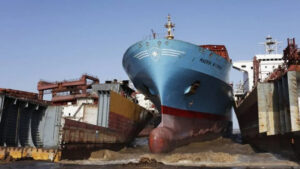A growing question among the shipping industry revolves around the location and safety guidelines, regarding the scrapping of a growing number of older EU-flagged vessels. In its latest weekly report, shipbroker Clarkson Platou Hellas pointed out that “there was no respite for the recycling industry players this week following Posidonia, as several from the industry headed for the EU Ship Recycling conference in Rotterdam, where surprisingly there was no presence from the EU! This severely questions their intent to ever approve India as an EU ship recycling destination and worryingly poses more questions for the future, when inevitably the market will be over supplied, including European flagged units. This is despite the tremendous efforts made by the Indian recycling yards to improve their standards yearly, which now sadly appears to once again fall on deaf ears by the European commission. We have also started to see more VLCC’s coming into the market this week, which is unsurprising considering the poor freight market for V’s where fixtures seen at minus $per day and obviously below Opex, causing Owners to make great losses. It is expected and needed that we will see more units come into the market and finally provide some supply to what has been a starved recycling market this year in 2022. Pricing has stabilised this week following the recent correction from the local currency depreciations witnessed across the Indian sub-continent and it is hoped this week’s sales can provide a benchmark for the market and give Owners the confidence to know what the realistic recycling value is of their vessels”.

Meanwhile, in a separate note, Allied Shipbroking said that “ship recycling activity seemed to have slowed down this past week. The market continues to move at a subdued pace and it is estimated that any reversal in this trend is unlikely to take place any time soon. Things are more or less the same for all the Indian Sub-Continent markets. On the one hand, cash buyers and breakers are hesitant to make offers because of the sharp volatility in steel plate prices as well as the unfavorable exchange rate movements. Adding to this, we notice that these volatilities have not only pushed breakers to take a step back in the placement of offers, but are now also being faced with increased difficulties in securing Letters of Credit and financing from their banks, resulting in a significant cash flow squeeze for most.
On the other hand, the pool of vessels candidates appears quite limited due to the recovery in earnings, while end buyers will be faced with increased pressure to compete as their tonnage inventories start to run low. Adding to this great mix the fact that we are moving into the Monsoon Season for the Indian Sub-Continent, and you start to see a very difficult market picture emerge”.
GMS , the world’s leading cash buyer of ships added this week that “following the recent drastic falls – which have seen almost USD 100/LDT wiped off prices – the ship recycling industry in the Indian sub-continent seems to be taking a bit of a pause, as End Buyers remain less than confident to offer any firm prices with certainty. Adding to the frustration is the minimal number of candidates currently available to work on, such is the bullish state of all freight sectors. Accordingly, we may see a prolonged summer / monsoon lull across all sub-continent recycling locations.
On the West end, Turkey is far worse off with its plummeting steel plate prices (both import and local) and a currency that has shaken the local market to a standstill, with no new arrivals or even news of fresh deals as local offerings are firmly below the USD 300/MT mark. As such, given the state of global currencies, which continue to depreciate alarmingly against the U.S. Dollar, in addition to soaring inflation, it would not be surprising to see minimal or virtually NO deals concluded to End Buyers for the next few months. Indeed, even those vessels sold to Cash Buyers at recycling equivalent prices today are seeing previously unthinkable trading opportunities at fantastic levels, and those older assets are now being passed through drydock – so firm are chartering rates at present. This is (inevitably and expectedly) leading to pent up demand for recycling units as most plots are increasingly turning dormant and are in dire need to acquire vessels in order to fulfill L/C limits with banks. Local banks are also becoming tougher on granting fresh L/Cs (particularly for larger LDT vessels) and this is leading to End Buyers having to put up larger securities in order to obtain the necessary financing for new units”, GMS concluded.
Kindly like us on Facebook















